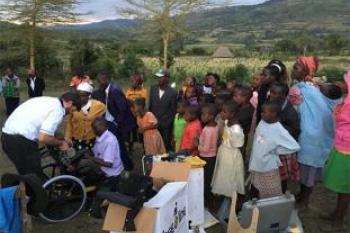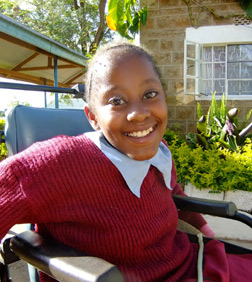Years ago, while attending a conference, a speaker issued a challenge that impacted me: “Given who you are right now, how can you best make a difference in the world for good?”
I could have answered this question differently at various stages in my life. Sometimes, at first, it seemed that I was doing nothing useful at all. But I began to see that little things could make a big difference, such as positive changes to my attitude, being present for my family, or encouraging one person at a time. God later opened doors for me to teach at a university, and now he is opening doors for my husband Phil and me to be catalysts in a process that will bring hope to those living with disabilities in low-income countries.
While Phil and I were working as professors, I was leading a research project on wheelchair function in low-resource countries. Through my research, I got to know the sources behind resources for training and wheelchairs designed for use in low-income countries. Having grown up in Kenya, I was familiar with faith-based health providers. I knew many weren’t connected with the wheelchair resources becoming available. This hurt my heart because I had seen Kenyan children, who weren’t able to walk, lying in a corner of their homes. These kids were alone and suffering from pressure sores in communities already served by faith-based health providers. Feeling isolated and cursed is harder than any physical limitation or difficulty. Faith-based health providers are in a position to address this pain! It takes training for a therapist to fit a wheelchair to a child properly. I knew that training was available, and wheelchairs were available too! If we could just connect the resources to the hospitals, these children and their families could move from isolation to hope.
Phil and I realized that we could do something about that. We wanted to leverage our professional skills to restore hope for those with disabilities. We initiated the Assistive Technology Catalyst Project. www.atcatalyst.org
Making wheelchairs and care available through faith-based hospitals will require significant cultural changes. Faith-based health providers are often focused on acute care; change is needed to help programs grow to include care for chronic disabilities. Organizations who provide funds have worked through government initiatives; change is needed to include faith-based health providers. Local cultures often see disability as shameful or a curse; change is needed for those with disabilities to be welcomed into community and church.
Amazingly, doors are opening! Wheelchair provision programs are being initiated by several faith-based health providers in Kenya. Karen has been invited to go to Geneva in late August to speak on the importance of working with faith-based health providers like mission hospitals. Her report would be part of the World Health Organization Global Report on effective access to Assistive Technology. If the secular granting agencies want to engage, that’s only possible if the mission hospitals are ready to engage as well. Some mission leaders are on board and have set it up so that Karen has been invited to present in September to a summit meeting of executives from 50 of the largest medical mission agencies. Another great opportunity is in the works! In October, the door is wide open to bring a team to Kenya who can teach a seminar on how to train parents of children with disabilities. This is a chance to enable local staff to build relationships and share true hope!!
The process of making wheelchair services available through faith-based health providers is not going to be fast or easy, and maybe it won’t happen in the way we hope. However, it is a huge honor to be involved in opening doors as this process begins. Thanks for partnering with us!


 Visit us on Facebook
Visit us on Facebook